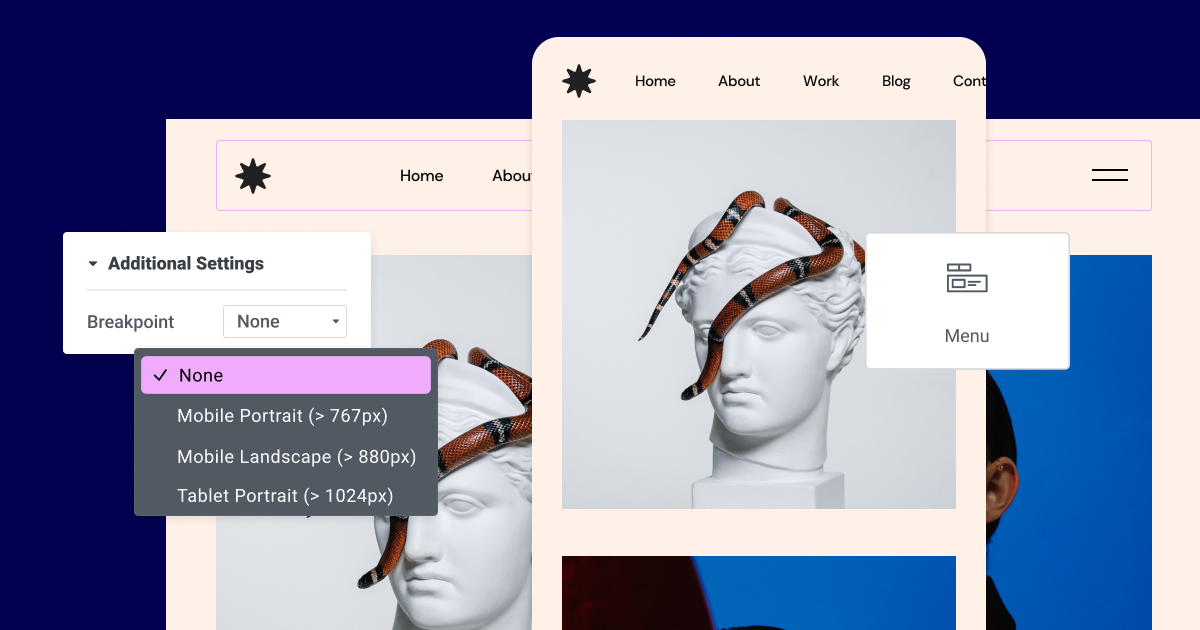Table of Contents
- The best free website builders
- A Word on “Free” Plans
- Top 7 Free Website Builders – Pros, Cons, and Best Uses
- Conclusion
-
+ FAQs
- What is a free website builder?
- What are the benefits of using a free website builder?
- What is the easiest free website builder to use for beginners?
- Can I create a professional-looking website with a free website builder?
- Which free website builder is best for e-commerce?
- Do these free website builders offer mobile-responsive designs?
- Can I connect a custom domain to my free website?
- Are there any limitations or hidden costs with free website builders?
- What kind of customer support can I expect with free website builders?
- Can I switch to a paid plan later if I need more features?
- Are there any free website builders that are specifically good for certain industries or niches (e.g., photographers, bloggers, restaurants)?
- Can I add my own code or customizations to my free website?
- What happens to my website if I decide to stop using the free website builder?
Many free website builders exist. They help people with different needs and skills. A recent study found something interesting. Nearly 71% of small businesses have a website. This shows how important it is to be online..
Free website builders can be fun to use. But they can also be confusing at first. How do you separate the top contenders from those that might leave you frustrated? That’s where this guide comes in.
A staggering 380 new websites are created every minute, demonstrating the increasing demand for simple web development solutions.
The best free website builders
- Elementor: Design-focused, easy to use WordPress builder, large design flexibility, AI Builder, advanced features (Best for SEO).
- Wix: Easy to use, AI, design-focused, wide range of templates.
- Weebly: Super simple, ideal for small, basic websites.
- WordPress.com: Basic blogging platform, good WordPress introduction.
- SITE123: Extremely beginner-friendly, great for quick website setup.
- Google Sites: perfect for simple projects, without SEO.
- Webflow: design control, advanced features for experimenters.
Grow Your Sales
- Incredibly Fast Store
- Sales Optimization
- Enterprise-Grade Security
- 24/7 Expert Service

- Incredibly Fast Store
- Sales Optimization
- Enterprise-Grade Security
- 24/7 Expert Service
- Prompt your Code & Add Custom Code, HTML, or CSS with ease
- Generate or edit with AI for Tailored Images
- Use Copilot for predictive stylized container layouts

- Prompt your Code & Add Custom Code, HTML, or CSS with ease
- Generate or edit with AI for Tailored Images
- Use Copilot for predictive stylized container layouts
- Craft or Translate Content at Lightning Speed
Top-Performing Website
- Super-Fast Websites
- Enterprise-Grade Security
- Any Site, Every Business
- 24/7 Expert Service

Top-Performing Website
- Super-Fast Websites
- Enterprise-Grade Security
- Any Site, Every Business
- 24/7 Expert Service
- Drag & Drop Website Builder, No Code Required
- Over 100 Widgets, for Every Purpose
- Professional Design Features for Pixel Perfect Design

- Drag & Drop Website Builder, No Code Required
- Over 100 Widgets, for Every Purpose
- Professional Design Features for Pixel Perfect Design
- Marketing & eCommerce Features to Increase Conversion
- Ensure Reliable Email Delivery for Your Website
- Simple Setup, No SMTP Configuration Needed
- Centralized Email Insights for Better Tracking

- Ensure Reliable Email Delivery for Your Website
- Simple Setup, No SMTP Configuration Needed
- Centralized Email Insights for Better Tracking

- Ensure Reliable Email Delivery for Your Website
- Simple Setup, No SMTP Configuration Needed
- Centralized Email Insights for Better Tracking
A Word on “Free” Plans
Before we start, let’s talk about what “free” really means. Free website builders often have some limits:
- Advertisements: Some builders will place ads on your website as a way to monetize their free plan.
- Limited Storage and Bandwidth (data transfer): You might have restrictions on how much content you can upload or how much traffic your site can handle.
- Missing Advanced Features: Things like advanced e-commerce tools, detailed analytics, or custom code integration might require upgrading to a paid plan.
This way, you know what to expect from free plans.
What makes a Great Free Website Builder?
A great free website builder should:
- Easy to Use: Drag-and-drop interfaces and pre-designed templates make the process accessible to both beginners and experienced users.
- Customizable: Allow for design flexibility, including mobile responsiveness and styling options.
- Feature-Rich: Include essential tools like blogging capabilities, contact forms, and basic SEO options.
- Well-Supported: Offer good community support and documentation.
- Hosting: The builder should offer hosting, or at least be compatible with third-party hosting.
Ease of Use
Building a website should be optional for a degree in computer science. The best free website builders focus on easy to use interfaces that make the process approachable for both beginners and those with some technical experience. Look for these features:
- Drag-and-drop interfaces: The ability to visually move and place elements like text, images, and buttons without writing code is a game-changer.
- Pre-designed templates: Templates give you a solid starting point and help you envision your website’s potential. Market research indicates that over 65% of website projects begin with a pre-designed template.
- Clear settings and customization options: You should be able to adjust colors, fonts, and layouts without feeling lost in a maze of menus. a streamlined settings panel is crucial for beginners with free website builders.
Design Flexibility
Even with a free plan, you want control over the look and feel of your website. Here’s what to look for:
- Customizable Templates: While templates are a great starting point, the ability to tweak them is crucial for making your website stand out. Look for builders that give you at least some flexibility with your chosen template.
- Mobile Responsiveness: Your website must look great on all devices, from smartphones to desktops. In 2023, over 59% of all website traffic worldwide came from mobile devices. (Statista) Free builders should offer tools for adjusting how your site appears on different screen sizes.
- Control Over Styling: Options for changing colors, fonts, backgrounds, and spacing put you in charge of your website’s aesthetic.
important Features
A free website builder should provide more than just a pretty face. These core functionalities will help you create a website that serves its purpose:
- Blogging Capabilities: If you want to share written content, look for a builder with a built-in blog system or easy integration with blogging platforms. WordPress powers over 43% of all websites for a reason! (W3Techs)
- Contact Forms: a simple contact form allows visitors to get in touch without exposing your email address to spam.
- SEO Basics: While free plans might not offer advanced SEO tools, you’ll want options to edit page titles and meta descriptions, as well as at least some control over how your site appears in search results.
- Image Optimization: Website speed matters! Look for builders that have some form of image compression or optimization. Slow loading times can negatively impact your user experience AND your search engine rankings.
Community and Support
When you’re using a free product, a supportive community can be invaluable for those inevitable questions or troubleshooting sessions. Consider:
- Documentation and Tutorials: Clear guides and step-by-step instructions make a world of difference.
- Forums and User Groups: The ability to connect with other users, ask questions, and share solutions adds another layer of support.
Technical Features
Even free plans should include essential technical capabilities:
| Feature | Why It Matters |
|---|---|
| SSL Certificate | Secures your website and builds trust |
| Mobile Optimization | Ensures your site works on all devices |
| Basic SEO Tools | Helps your site get found in search results |
| Performance Options | Keeps your site loading quickly |
Top 7 Free Website Builders – Pros, Cons, and Best Uses
Now that you understand what to look for in a free website builder let’s examine seven of the most popular options. We’ll cover each builder’s strengths, weaknesses, and the types of projects it is best suited for.
1. Elementor Free Website Builder
18 Million websites use Elementor website builder
Elementor Best for: Design-focused individuals, creatives, and small to medium-sized businesses who want a user-friendly and visually appealing website. Especially good for those familiar with WordPress or who want strong SEO capabilities.

Elementor is the most popular WordPress plugin that offers a visual, drag-and-drop website-building experience. Its free version provides a solid foundation for crafting custom designs within your WordPress environment.
Strengths
- Easy to use Visual Editor: Elementor’s cornerstone feature is its drag-and-drop interface. With it, you can design pages in real-time, seeing exactly how elements will look without needing to touch code.
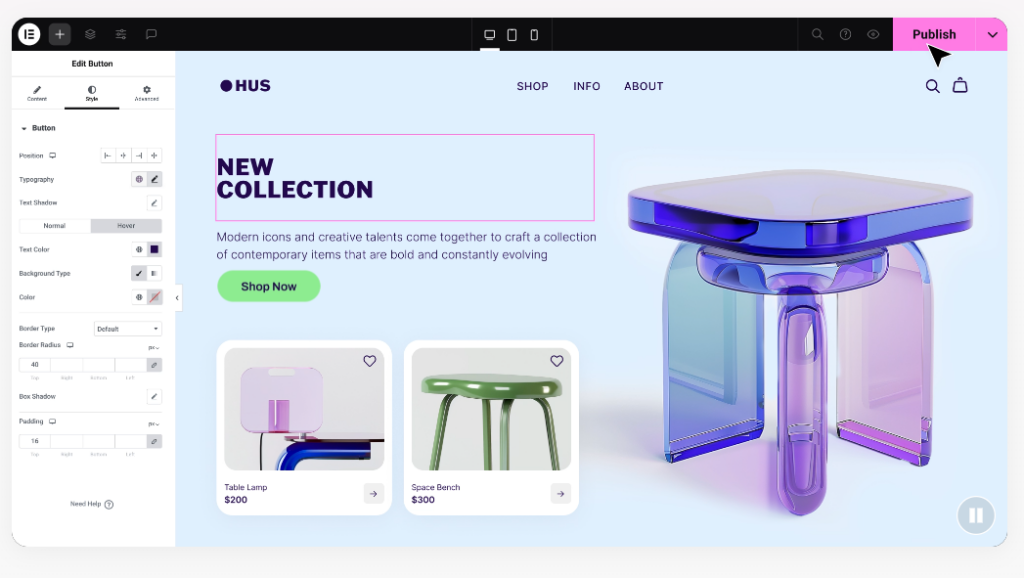
- Widgets: The free version offers a solid collection of basic content widgets (text, images, headings, buttons, etc.) and some layout widgets (columns, spacers, etc.).
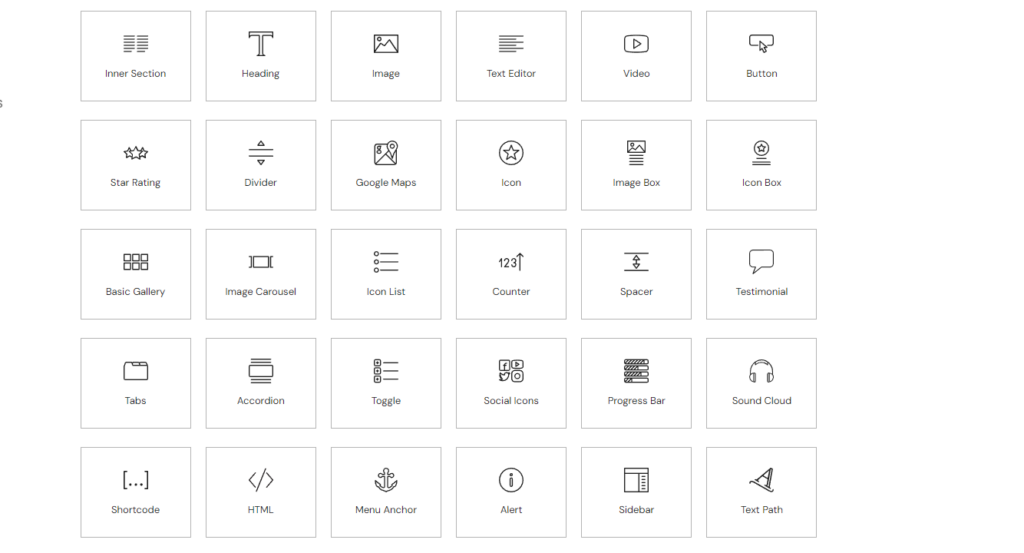
- The power of WordPress: for blogging and content-driven websites and Access to the large WordPress ecosystem of themes and plugins
- Responsive Design: Elementor lets you easily adjust layouts for different device sizes (desktop, tablet, mobile), ensuring your site looks good everywhere.
- Pre-Designed Templates: Access a sizable library of professional-looking templates, providing a quick starting point for your website design.
- Customization Options: While less extensive than the Pro version, you still get decent control over colors, fonts, spacing, and backgrounds to shape your site’s appearance.
- Community Support: Elementor enjoys a large and active community. You can often find help and tutorials online.
- 3rd-Party Add-ons (apps): Extend Elementor’s capabilities with 3rd-party add-ons developed by our community. Explore valuable add-ons that enhance your website building experience or build your own custom solutions.
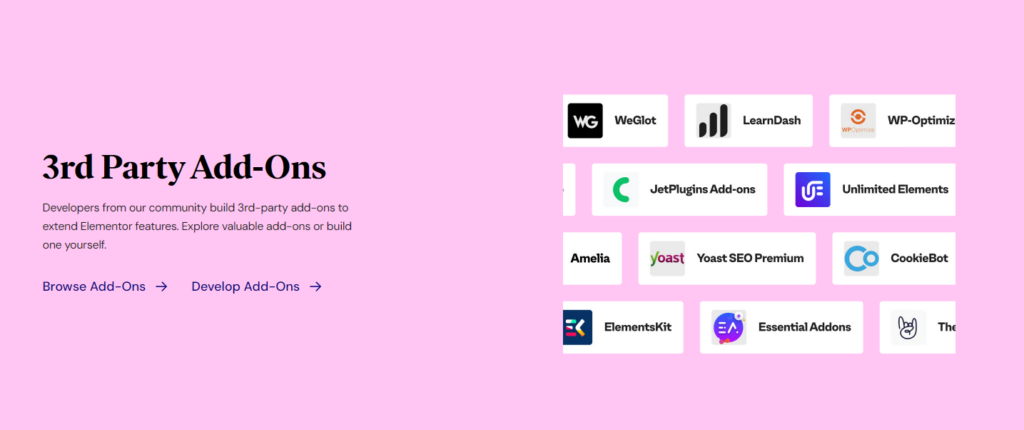
- Translation Ready: Works with plugins like WPML to create multilingual websites.
- Background Overlays: Add visual flair and depth to sections with image, gradient, or video overlays.
- Global Styling: Set site-wide defaults for colors, fonts, and typography to maintain consistency.
- Custom CSS: If you know a little CSS, you can add small styling customizations.
- Elementor AI Website Builder: Leverages artificial intelligence to speed up content generation and design. (Note: Elementor AI features require a paid subscription)
- Completely Free: A major advantage is that you can build a fully functional website without any costs.
Considerations
- Some advanced design features require the Elementor Pro upgrade
- It does not include “free” hosting
Who Is Elementor (Free Version) Best For?
- Elementor is best for beginners, creatives, and small—to medium-sized businesses seeking a user-friendly and visually driven way to build basic WordPress websites.
- WordPress Users: If you already have a WordPress site, Elementor is a great way to add more design power without switching platforms.
- Content Creators: Bloggers or businesses who want better control over the layout and styling of their posts and pages.
- Budget-Conscious Users: The free version allows you to build a functional website, though the upgrade offers more complex features.
Elementor (Free Version) offers WordPress users a significant step up in design control and customization. Its easy to use interface and core widget set make it a great way to elevate the look of your content without breaking the bank. However, be aware that some power features and advanced design options remain exclusive to Elementor Pro.
What Elementor Pro offers that Elementor Free doesn’t
Elementor Pro offers a wide range of features and functionalities that are not available in the free version of Elementor. These include:
Design:
- Theme Builder: Design and customize every part of your website, including headers, footers, single posts, archive pages, and more.
- More Widgets: Access to over 50 additional pro widgets, including sliders, forms, portfolios, pricing tables, and many more.
- Motion Effects and Animations: Add eye-catching animations and effects to your website elements.
- Global Widgets: Create reusable custom widgets and use them anywhere on your site.
- Custom Fonts: Upload and use your own fonts throughout your website.
Marketing:
- Popup Builder: Create popups to capture leads, promote offers, or deliver important messages.
- Form Builder: Build complex forms with multi-step features and conditional logic.
- Integrations: Connect Elementor with popular marketing tools like Mailchimp, HubSpot, and more.
WooCommerce:
- WooCommerce Builder: Customize the design of your product pages, shop pages, cart, and checkout.
- WooCommerce Widgets: Use dedicated widgets for product displays, add-to-cart buttons, product reviews, and more.
Additional Features:
- Dynamic Content: Display content dynamically based on user roles, post types, or other conditions.
- Role Manager: Control access to specific Elementor features for different user roles.
- Premium Support: Get priority support from Elementor experts.
Is Elementor Pro Worth It?
Whether or not Elementor Pro is worth it depends on your specific needs and budget. If you’re building a simple website, the free version may be sufficient. However, if you need more advanced features and flexibility, Elementor Pro is a worthwhile investment.
2. Wix Free Website Builder
11 Million websites use the WIX website builder
Wix Best for: Beginners and those who want a wide variety of templates and design options.
Wix is a prominent cloud-based website-building platform known for its easy to use drag-and-drop interface and wide range of templates. Let’s examine its features, pros and cons, and who it might best suit.
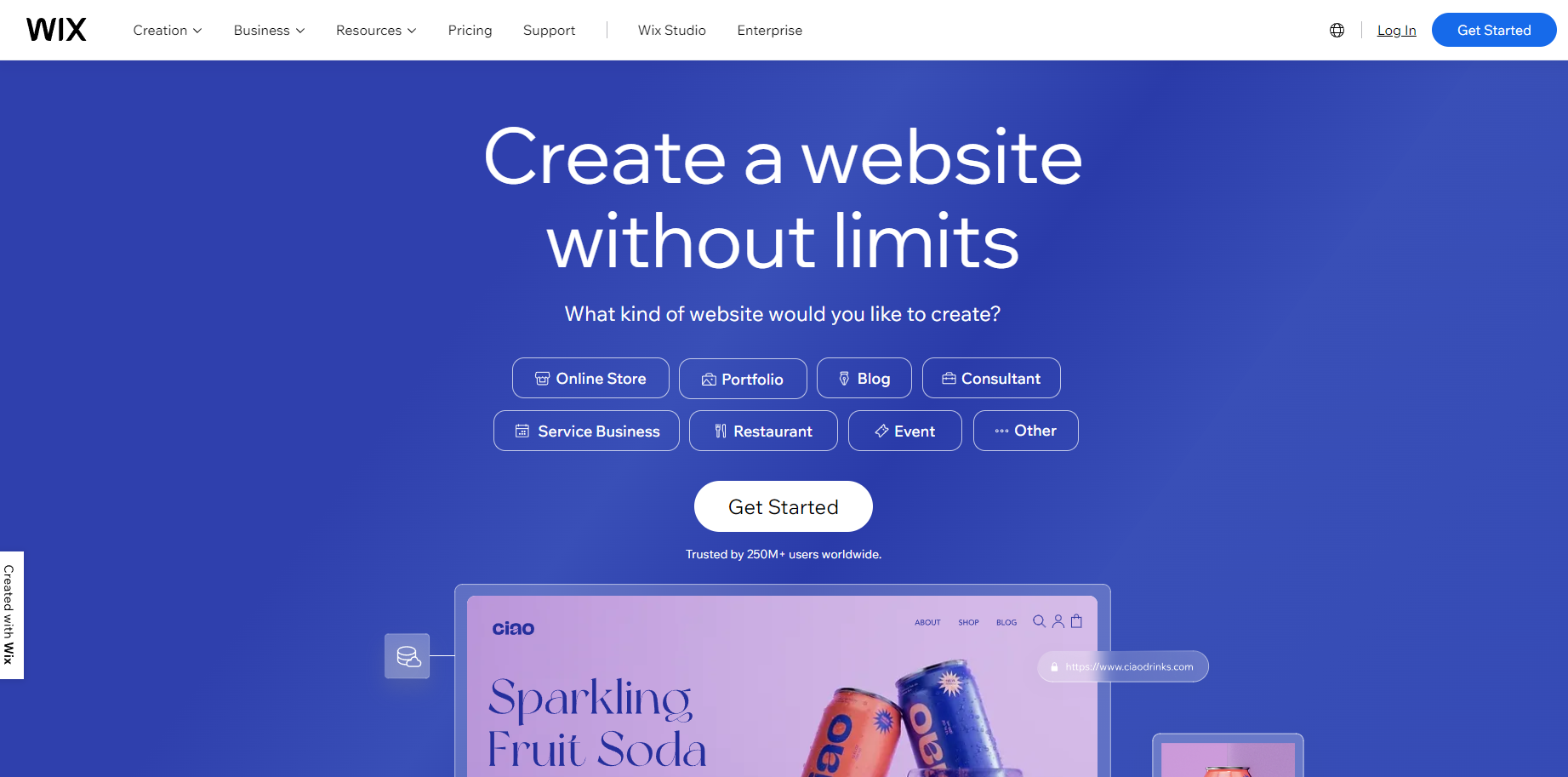
Strengths
- Ease of Use: Wix’s core appeal is its exceptional user-friendliness. The drag-and-drop editor makes designing a website a breeze, even for those who need more technical experience.
- Design Flexibility: Offering hundreds of visually appealing templates across categories like business, eCommerce, portfolios, and blogs, Wix ensures plentiful starting points for customization.
- Features & Apps: Wix boasts a robust set of built-in features and an extensive app market (Wix App Market). Enhance your site with booking systems, contact forms, image galleries, video integration, and much more.
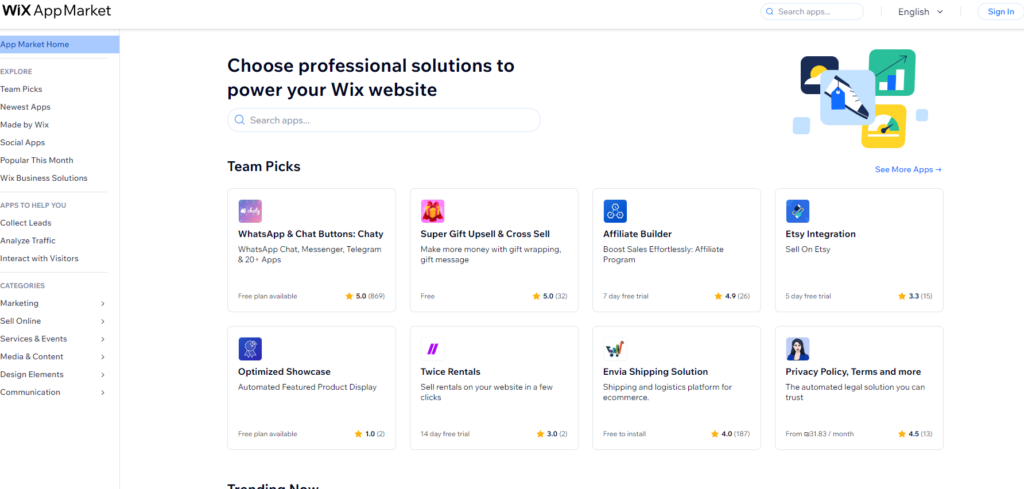
- E-commerce Capabilities: Wix provides solid tools for setting up an online store. Features like inventory management, payment gateways, and shipping options make it suitable for small to medium-sized businesses.
- Popularity: Wix is the most popular website builder globally, suggesting strong community support and user confidence.
Considerations
- Template Lock-in: Switching templates after you’ve built much of your website can be a hassle, as content sometimes transfers seamlessly.
- Pricing: The free plan has limitations (Wix ads, no custom domain). Paid plans offer more storage, data transfer, and features, which can increase the cost.
Who is Wix Best Suited For?
- Beginners: Individuals or small businesses seeking to establish an online presence quickly and easily.
- Creatives: Artists, photographers, etc., who focus on showcasing their work in visually appealing ways.
- Small to medium-sized eCommerce businesses: Those with straightforward online store needs.
Wix is a powerful and popular website builder that excels in user-friendliness and design. Its large template library and easy to use editor make it a compelling option for beginners and those seeking a visually engaging website. While it may have some limitations in advanced scalability, Wix remains a worthy choice for various use cases.
What Wix Pro gives that Wix Free Website Builder doesn’t
Wix Pro offers several advantages over the Wix Free Website Builder:
- No Wix Ads: Wix Pro removes Wix branded ads from your website, giving it a more professional look.
- Custom Domain: You can connect your own domain name (e.g., www.yourbusiness.com) to your website, strengthening your brand identity.
- More Storage and data transfer: Wix Pro plans offer more storage space for your website’s content and higher bandwidth to handle more website visitors.
- Free Domain Voucher: Some Wix Pro plans include a free domain voucher for the first year.
- Additional Features: Wix Pro plans may include additional features like visitor analytics, professional email marketing tools, and more advanced e-commerce capabilities.
- Priority Customer Support: Wix Pro users generally receive faster and more dedicated customer support.
To summarize, Wix Pro provides a more professional and comprehensive website building experience compared to the Wix Free Website Builder, offering a custom domain, ad-free website, more storage, additional features, and priority customer support.
3. Weebly Free Website Builder
1.6 Million websites use the Weebly website builder
Weebly Best for: Simple websites and those new to website building.
Weebly is a standalone website builder similar to Wix. Weebly is a long-standing AJAX-based website builder with a reputation for exceptional ease of use. Its free plan offers a streamlined way to get a basic website online quickly.
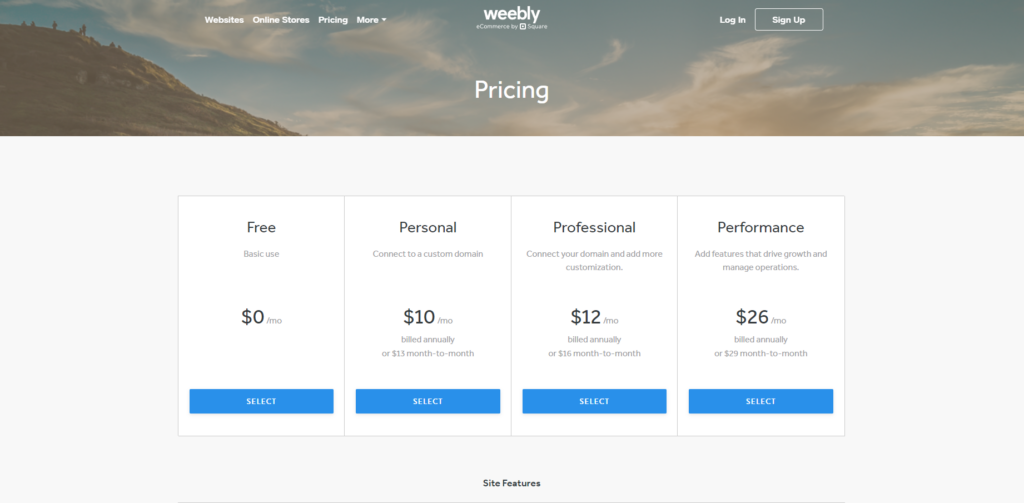
Strengths
- Supreme Simplicity: Weebly’s core appeal lies in its drag-and-drop interface, making the website-building process remarkably beginner-friendly.
- Clean Designs: Weebly provides a collection of modern and aesthetically pleasing templates to give your website a polished foundation.
- Basic eCommerce: Remarkably, the free version allows you to start a small online store with core essentials like product listings, a shopping cart, and payment processing.
- App Center: The Weebly App Center offers a selection of free and paid apps to extend your website’s features.
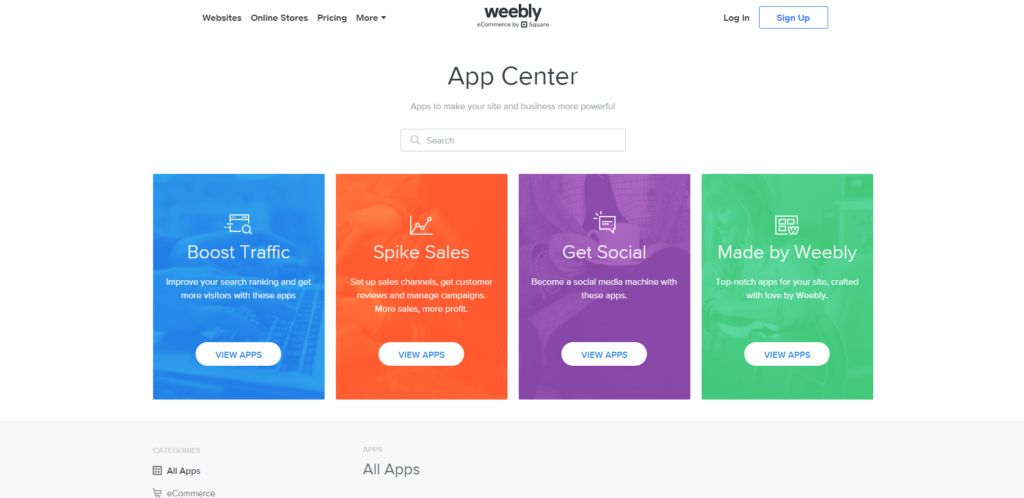
- Community & Support: Weebly has a well-established user base and support resources to help you get started.
Considerations
- Weebly Branding: The free plan displays Weebly ads on your site.
- Limited Storage & data transfer: The free version caps storage and data transfer, making it best suited for smaller websites.
- Custom Domain: You’ll use a Weebly subdomain unless you upgrade.

Who is Weebly (Free Version) Best For?
- First-Time Website Builders: Those seeking the most straightforward path to launching a website with minimal technical hurdles.
- Small-Scale Projects: Ideal for personal portfolios, hobby blogs, or simple business landing pages.
- Testing the Waters: The free plan is an excellent way to try out Weebly before committing to a paid subscription.
Weebly’s free version excels at making building a simple website incredibly accessible. If you focus on ease of use and need a basic online presence, it’s a great starting point. Large, more complex websites might benefit from the features and scalability offered by Weebly’s paid plans or other builders.
4. WordPress.com Free Website Builder
2.6 Million websites use the WordPress.com website builder
WordPress.com Best for: Bloggers and those who want a simple introduction to WordPress.
WordPress.com is a hosted version of the world’s most popular content management system (CMS), WordPress. The free plan offers a way to dip your toes into the WordPress ecosystem with ease.
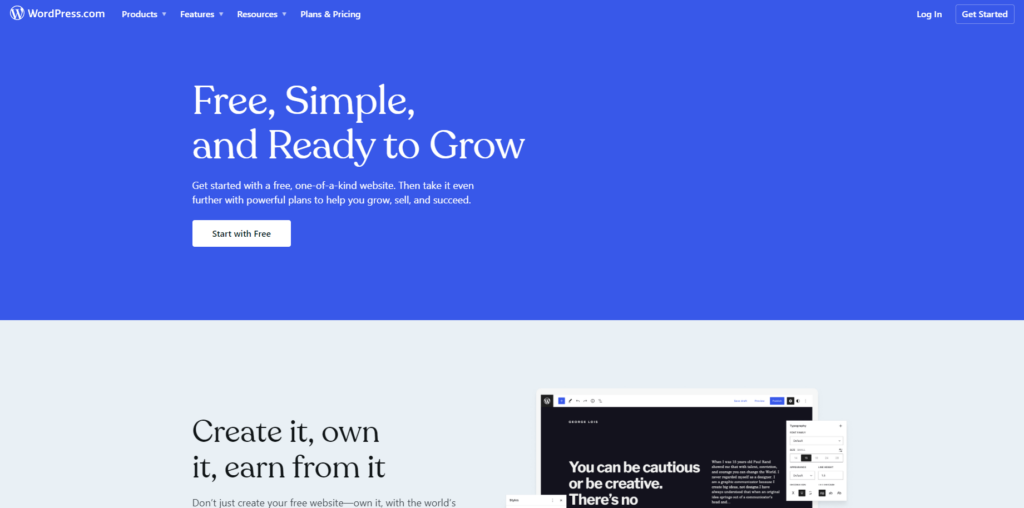
Strengths
- Blogging Focus: WordPress.com shines in its easy to use blogging tools. Creating and publishing posts with text, images, and embedded media is straightforward.
- WordPress Familiarity: The free version introduces you to the core WordPress interface, a valuable skill if you plan to scale up to self-hosted WordPress later.
- Customization Options: While limited compared to self-hosted WordPress, you still get a decent selection of themes and basic site design controls.
- Community and Support: WordPress benefits from large community resources, tutorials, and forums. While some help is geared towards self-hosted versions, much is still applicable.
- Global Reach: WordPress powers a significant portion of the web, indicating widespread recognition and potential compatibility benefits.
Considerations
- Advertisements: The free plan includes WordPress.com ads on your site.
- Storage Limits: File uploads and overall site size have a cap.
- No Custom Plugins: The ability to extend features with plugins, a cornerstone of WordPress’s power, is restricted on the free plan.
- Limited Monetization: Options for directly monetizing your site are constrained.
Who is WordPress.com (Free Version) Best For?
- New Bloggers: Ideal for those who want a simple platform to start writing and sharing content without technical setup worries.
- Learners: A good way to test out the WordPress basics before investing in a self-hosted website.
- Limited-Need Personal Sites: These sites are suitable for hobby projects or simple online profiles where control and complex features aren’t top priorities.
WordPress.com’s free version is a decent entry point into blogging and the WordPress world. If you want to experiment, start a simple blog, or get acquainted with the WordPress dashboard, it’s a convenient option. However, be aware of the limitations if you anticipate needing advanced features, plugins, or greater control over your website.
5. SITE123 Free Website Builder
80K websites use the SITE123 website builder
SITE123 Best for: Beginners who want to create a website quickly and easily.
SITE123 focus on speed and simplicity in website creation. Its free version offers a way to establish a basic online presence with minimal technical know-how.
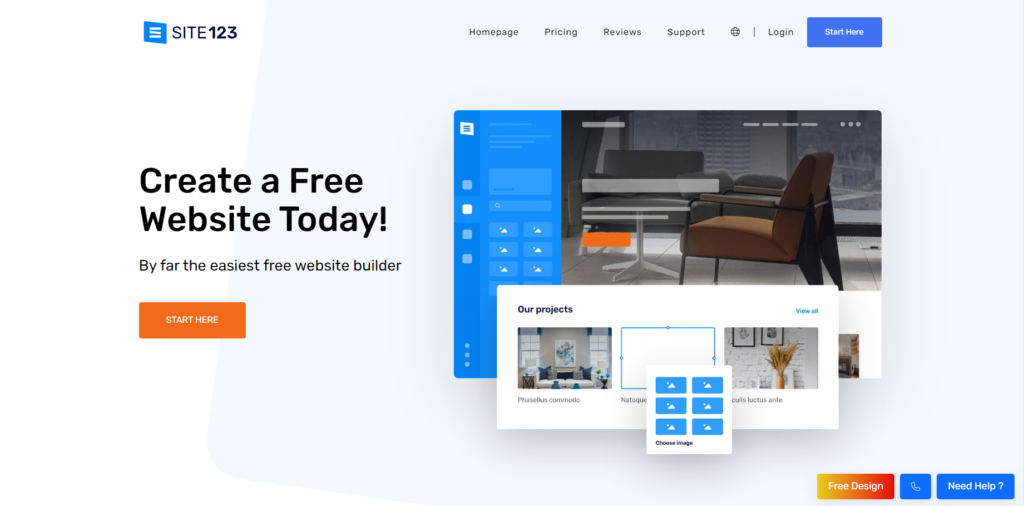
Strengths
- Ease of Use: SITE123 excels in its user-friendly interface. It uses a structured rather than a fully drag-and-drop approach, making the design process straightforward.
- Rapid Setup: You can have a functional website up and running remarkably quickly with SITE123’s guided process.
- Decent Templates: SITE123 provides a selection of visually appealing templates to serve as starting points for various website types.
- important Features: The free version includes basic SEO tools, social media integrations, and the ability to add a contact form.
- Multilingual Support: SITE123 boasts strong multilingual capabilities, making it a good choice for sites needing to cater to multiple languages.

Considerations
- Limited Customization: While easy to use, the editor offers less granular design control compared to some drag-and-drop builders.
- SITE123 Branding: The free plan displays SITE123 advertisements on your website.
- Storage and Bandwidth Caps: You get limited storage space and monthly data transfer.
- No Custom Domain: Your website will use a SITE123 subdomain (e.g., yoursite.site123.me) on the free plan.
Who is SITE123 (Free Version) Best For?
- Absolute Beginners: Those completely new to website building will appreciate its structured approach and guidance.
- Simple Websites: Ideal for personal profiles, portfolios, or small business sites with straightforward information presentation needs.
- Time-Sensitive Launches: SITE123’s emphasis on speed makes it attractive if you need a website up and running quickly.
SITE123’s free version is a great option for individuals and businesses needing a basic, no-fuss online presence. If your focus is on ease and speed and your website requirements are simple enough, it could be a good fit. For increased customization freedom and to remove SITE123 branding, consider their paid plans.
6. Google Sites Free Website Builder
1.1 Million websites use the Google Sites website builder
Google Sites Best for: Simple projects and websites that don’t need strong SEO.
Google Sites is a free website builder seamlessly woven into the Google Workspace ecosystem. Its primary draw is its simplicity and tight integration with other Google tools.
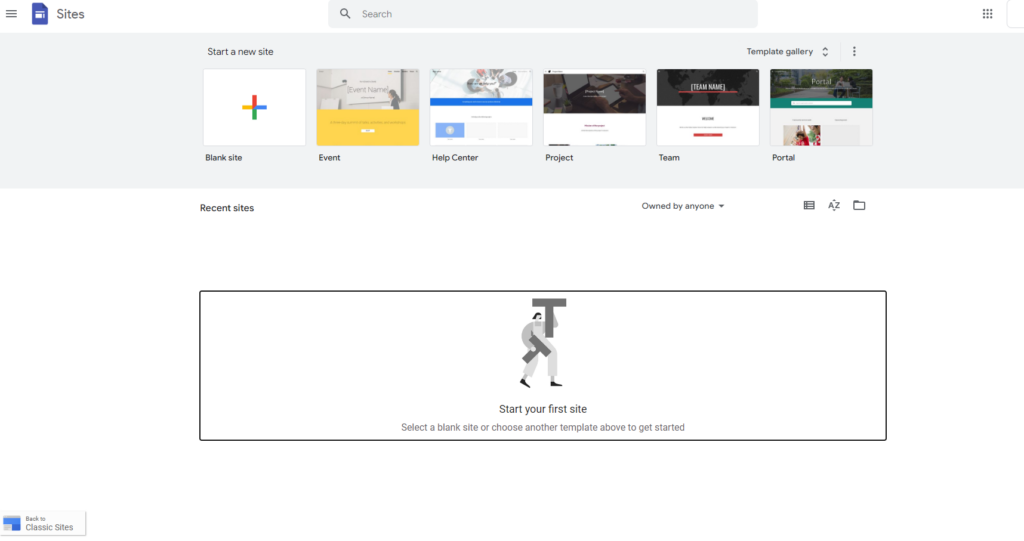
Strengths
- Ultimate Ease of Use: If you’re looking for the most beginner-friendly option, Google Sites is tough to beat. The interface could be clearer and more familiar to anyone who uses Google Docs or Slides.
- Google Integration: Effortlessly embed Google Drive files, Docs, Sheets, Slides, Calendars, Maps, and more, directly into your website.
- Collaboration: Like other Google tools, real-time collaboration is built-in. Work on your site with teammates seamlessly.
- Free with a Google Account: If you have a Google account (Gmail, etc.), there’s no additional cost to start using Google Sites.
- Suitable for Internal Projects: Due to its sharing controls within an organization, it is a good option for intranets, team project sites, or simple knowledge bases.
Considerations
- Limited Design Flexibility: Google Sites’ customization options are basic. If you seek extensive control over the look of your site, It might feel restrictive.
- Basic Features: Sites focus on core essentials, lacking advanced features like blogging systems or in-depth eCommerce tools.
- No Custom Domain (Free): Your free site will be on a sites.google.com/view/yoursitename type domain. Custom domains require a Google Workspace subscription.
Who is Google Sites Best For?
- Google Workspace Users: Those already using Google Drive and other tools will find it a natural extension for website needs.
- Small-Scale Projects: Ideal for simple personal sites, hobby pages, or temporary event websites.
- Internal Teams: Great for basic collaboration sites within a school or business using Google Workspace.
Google Sites excels in its simplicity and seamless integration with the Google suite. If you need a straightforward website, focus on ease of use, and already utilize Google tools, it’s a strong contender. Other builders might be a better fit for heavily customized designs or advanced features.
7. Webflow Free Website Builder
800K websites use the Webflow website builder
Webflow Best for: Experienced users and designers who want advanced customization options.
Webflow stands out in the website building space for its incredible visual design control and focus on interactions and animations. The free plan offers a way to test the waters of this powerful platform.
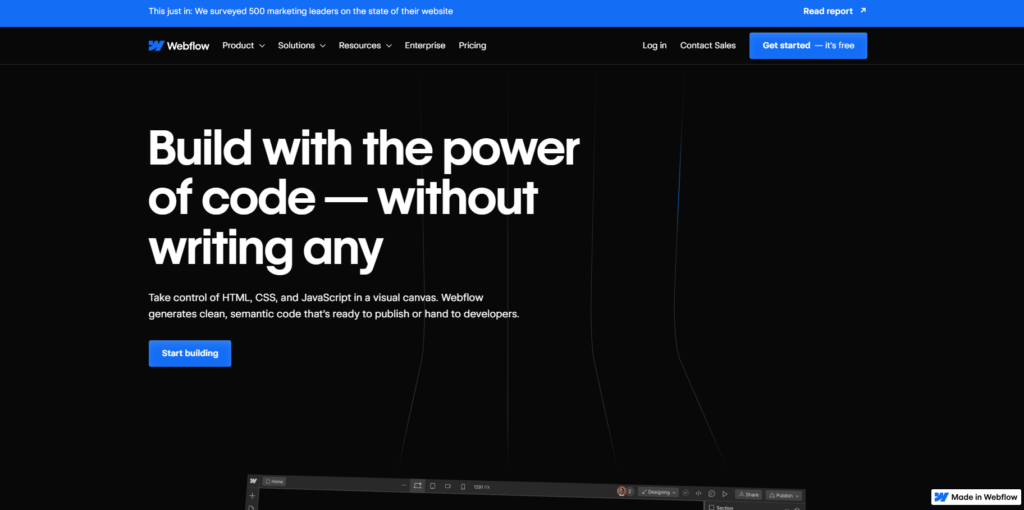
Strengths
- Design Power: Webflow grants you pixel-perfect control over your website’s layout and styling, using concepts similar to professional design tools.
- Animations & Interactions: Create eye-catching animations and micro-interactions to add a ‘wow’ factor to your website.
- Designer-Centric: If you have a design background or a strong desire to craft your site’s visuals precisely, Webflow resonates.
- CMS Capabilities: Even the free plan includes basic Content Management System (CMS) features to build dynamic, data-driven content like blog posts or project listings.
- Educational Value: Learning Webflow, even through the free version, can enhance your web design skills and understanding.
Considerations
- Project Limitations: The free plan limits you to two projects and has staging restrictions.
- No Custom Domain: Your site will live on a Webflow subdomain on the free plan.
Who is Webflow (Free Version) Best For?
- Web Designers in Training: A fantastic way to learn Webflow’s core concepts and build your design portfolio.
- Experimenters: If you’re design-minded and curious about Webflow’s unique capabilities, it’s worth exploring without commitment.
- CMS Exploration: The free plan gives you a taste of Webflow’s CMS for managing structured content.
Webflow’s free version serves mainly as a powerful learning tool and testing ground. If you’re seeking deep visual control and are willing to invest in learning the platform, it offers excellent value despite its limitations. However, deploying live websites and using custom domains requires upgrading to a paid plan.
Common Challenges with Free Website Builders
Let’s face it – free website builders come with their share of hurdles. But don’t worry – I’ll show you exactly how to overcome each one. Here’s what you need to watch out for:
The Advertising Challenge
Most free website builders display ads on your site. These aren’t just any ads – they’re usually prominent banners or pop-ups that can distract your visitors. According to our research, 87% of free website builders include some form of advertising.
| Platform | Ad Type | Impact Level | Solution |
|---|---|---|---|
| Wix Free | Header Banner | High | Upgrade to starter plan |
| Weebly Free | Footer Bar | Medium | Upgrade to paid plan |
| Elementor Free | None | None | N/A |
Storage Limitations That Matter
Storage restrictions can seriously impact your website’s functionality. Here’s what you typically get with free plans:
- Wix: 500MB storage
- Weebly: 500MB storage
- Google Sites: 15GB (shared with Google Drive)
- Elementor: Depends on hosting provider
Smart Storage Solutions
To maximize limited storage, consider these proven strategies:
- Compress images before uploading
- Use external video hosting (YouTube/Vimeo)
- Regular content audits to remove unused media
Bandwidth Restrictions Explained
Bandwidth limits can make or break your website’s performance. Most free plans offer between 500MB to 1GB monthly bandwidth. This means if your site gets popular, it might become unavailable until the next month.
| Traffic Type | Approximate Bandwidth Usage | Monthly Visitor Limit |
|---|---|---|
| Text-heavy pages | 1-2MB per visit | 250-500 visitors |
| Image-rich pages | 5-10MB per visit | 50-100 visitors |
| Multi-media sites | 15-20MB per visit | 25-30 visitors |
Why Elementor Usually Outshines the Competition?
We’ve covered a range of free website builders, each with its own advantages and trade-offs. But why does Elementor consistently receive high praise within the WordPress community and beyond? Let’s break down a few key reasons:
WordPress Advantage
WordPress boasts an unparalleled collection of themes, plugins, and extensions. Elementor taps into this large library, giving you the potential to extend your website’s features in countless ways. Need a booking system? An e-commerce store? A forum? There’s already a WordPress plugin for that, and it’ll likely play nicely with Elementor.
Easy to Use, User-Friendly Interface
Elementor is an exceptional drag-and-drop editor. It’s incredibly easy to use – even first-time users can quickly grasp the basics and start crafting visually appealing pages. The free version provides a wealth of widgets for important elements like text, images, buttons, and more, granting you ample creative control.

Customization Galore
With Elementor, you’re not locked into rigid templates. The free plan offers a solid range of design options, allowing you to tweak colors, fonts, and spacing. This ensures your website has a distinct look that reflects your brand or personal style.
Impressive Performance
Elementor focus on producing clean, fast-loading code. This not only makes for a great user experience but also gives your website an edge in search engine rankings, something many free builders neglect.
Thriving Community and Resources
Elementor commands a massive global community with over 16 million active installs. This translates to a large collection of free tutorials, guides, and third-party extensions to help you get the most out of the platform, even without upgrading to Pro.
Design Control with Elementor Pro
While the free version of Elementor is powerful in itself, upgrading to Elementor Pro unlocks even more design potential:
- Theme Builder: Break free from your theme’s constraints. With Pro, you can design headers, footers, single post templates, archive pages, and even WooCommerce product pages. This gives you complete control over your entire site’s look and feel.
- Form Builder: Create stunning contact forms, multi-step forms, surveys, and more, all visually styled to integrate perfectly with your design. Pro allows for deep customization, including conditional logic and advanced post-submission actions.
- Popup Builder: Design eye-catching popups for promotions, lead generation, or announcements. Fine-tune targeting and triggers to ensure they appear at the perfect moment.
- Dynamic Content: Bring your site to life by displaying content directly from custom fields, posts, or other WordPress data sources. This makes it incredibly easy to keep your website up-to-date and engaging.
- Global Widgets: Create reusable design blocks you can place anywhere on your site. Update once, and changes reflect throughout – ensuring consistency and saving time.
Pro-Level Design Tools
- More Widgets: Elementor Pro includes a whole suite of advanced widgets for sliders, Form Builder, WooCommerce Builder, Carousels, pricing tables, social media feeds, Mega Menu, and more, significantly expanding your design toolkit.
- Motion Effects: Add subtle animations like parallax scrolling and mouse hover effects to create a richer, more interactive user experience.
- Custom CSS: If you’re comfortable with CSS, directly inject your own styles into elements for ultimate customization power, or use AI to generate Custom CSS for you with a simple prompt.
- Advanced Typography: Go beyond basic font choices with access to a wider range of fonts, fine-grain control over font sizes, weights, and styles throughout your site.
Workflow Enhancements
- Revision History: Easily revert to earlier versions of your pages if you want to undo changes or experiment without fear.
- Premium Support: Get priority assistance from the Elementor team if you encounter issues or have technical questions.
Elementor Pro transforms your design experience. Imagine having the power to completely style every aspect of your website, inject eye-catching elements and animations, and build advanced popups and forms right within the editor. The only limit is your own creativity!
Performance Matters: The Importance of Hosting
The speed and reliability of your website’s hosting have a significant impact on user experience and SEO. Many free website builder plans use basic shared hosting, where your website shares resources with many others. This can lead to:
- Slow Loading Times: If other sites on the shared server experience traffic spikes, your website might slow down.
- Downtime: Shared hosting can be more prone to outages or performance issues.
- Limited Resources: You might have restrictions on how much traffic your site can handle or the amount of storage you’re allocated.
What is Elementor Hosting?
It’s a fully managed WordPress hosting solution provided by Elementor themselves. This means Elementor handles all the technical aspects of running your WordPress website, so you can focus entirely on building and designing.
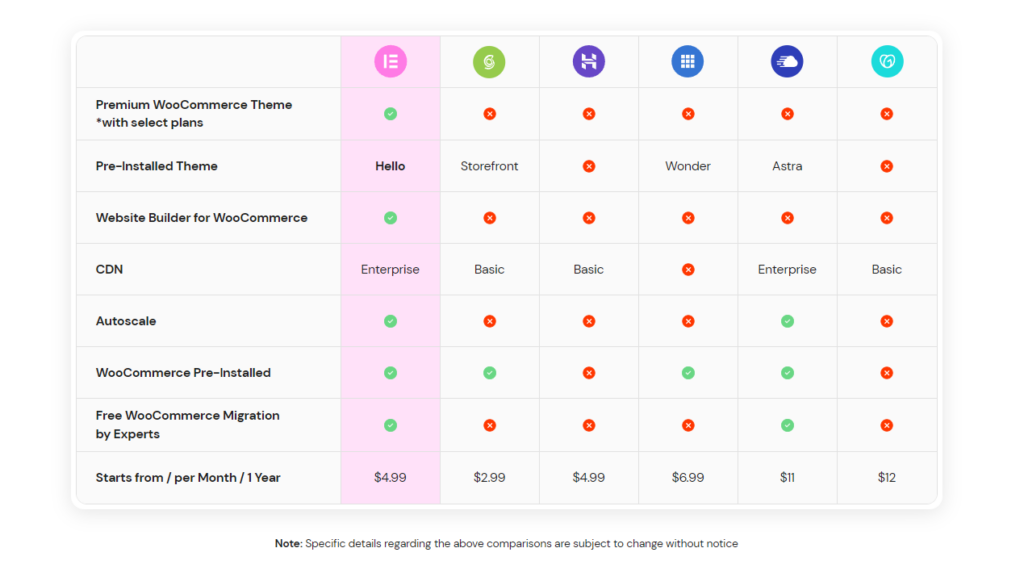
Features of Elementor Hosting
- Powered by Google Cloud: Your site is hosted on Google’s high-performance infrastructure, ensuring speed and reliability.
- Elementor & WordPress Pre-Installed: Elementor Hosting saves you setup time – your site is ready to start building the moment you sign up.
- Premium Cloudflare CDN: Your content is delivered globally with speed and security thanks to Cloudflare’s powerful content delivery network.
- Security & Protection: Features like DDoS protection, web application firewalls, and automatic backups safeguard your website.
- Staging Environments: Test changes and updates on a clone of your site before pushing them live.
- 24/7 Support: Get direct support from the Elementor team for any hosting-related issues.
Elementor Hosting vs. Shared Hosting
This is where Elementor Hosting stands apart. It’s built on the robust Google Cloud Platform and includes premium features like Cloudflare Enterprise CDN, resulting in faster load times, enhanced security, and a more reliable experience overall.
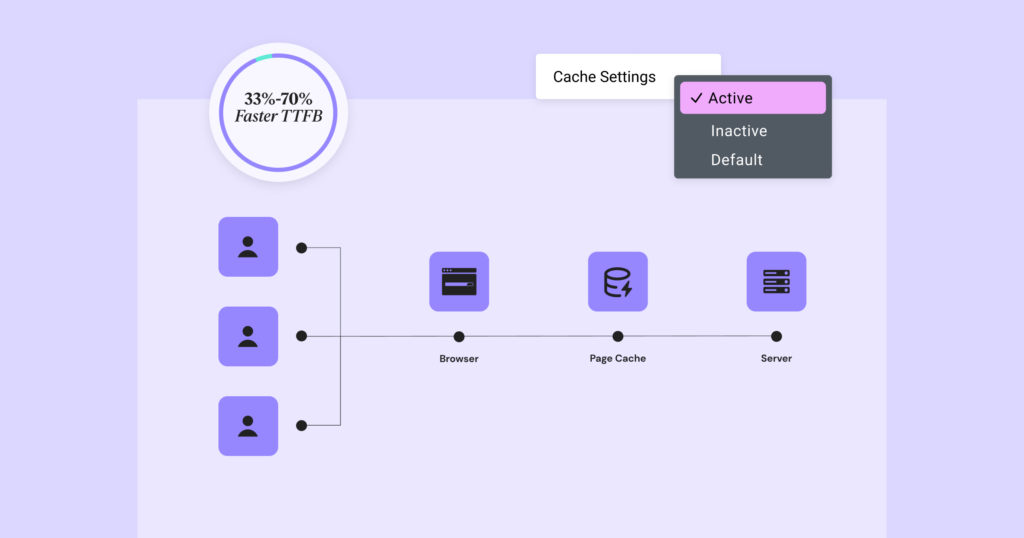
It’s important to be transparent that Elementor Hosting is a paid service. However, the performance and security benefits can often outweigh the costs, especially for websites that need to be fast, reliable, and prepared for growth.
Considerations Beyond “Free”
While the allure of “free” is strong, it’s important to think long-term when choosing a website builder. Here are some key factors to ponder:
Scalability: How Well Does the Platform Support Growth?
As your website gains traction, you might encounter the limitations of a free plan:
Traffic Limits
If your website attracts a significant number of visitors, you might hit your free plan’s bandwidth restrictions.
Storage Constraints
Free plans often have limited storage, which can become an issue if you have a lot of images, videos, or downloadable content.
Feature Restrictions
As your needs evolve, you might crave features like advanced forms, membership areas, or detailed analytics that are locked behind paid plans.
Monetization: Limits on Ads and E-commerce Features
If you plan to monetize your website, be aware of the following:
Third-Party Advertisements
Many free website builders display their own ads on your site to offset costs. These ads can detract from your website’s design and user experience.
Ecommerce Limitations
Free plans might offer basic online store features but restrict advanced features like inventory management, abandoned cart recovery, or multiple payment gateways.
The Hidden Costs of “Free”
While you might not be paying directly for a free website builder, there are other potential costs to consider:
Your Time
The DIY approach with free website building often requires a significant time investment in learning the platform, designing your site, and troubleshooting issues.
Opportunity Costs
The limitations of free plans might prevent you from implementing the features or designs you need, potentially hindering business growth or limiting your ability to achieve your website’s goals.
Lack of Full Control
With some free website builders, you don’t truly own your data or content, which might make it difficult to migrate your site elsewhere.
Is a Free Website Builder Right for You?
By now, you’re armed with a solid understanding of what free website builders offer and their limitations. The final question is: does a free solution truly align with your needs and goals?
Project Types: When “Free” Makes Sense
Free website builders can be a great fit for the following:
- Personal Projects: If you’re creating a hobby blog, portfolio, or a simple website for a non-profit, a free plan can be a sufficient starting point.
- Testing the Waters: Need more certainty about website building? A free website builder lets you experiment and get a feel for the process before committing financially.
- Limited Budget: For situations where budget is a major constraint, a free plan can help you launch a website, with the potential to upgrade later as your needs evolve.
The DIY Factor: Importance of Time Investment
Remember, free website builders generally require more hands-on work. Be prepared to invest time in:
- Learning the Platform: Familiarize yourself with the builder’s interface, tools, and features.
- Customization: Spend time tailoring your website’s design to match your needs and branding.
- Troubleshooting: Be willing to delve into documentation or community forums to resolve issues when they pop up.
Decision-Making Checklist
Before making your final choice, ask yourself these critical questions:
| Question | Why It Matters |
|---|---|
| What’s my technical skill level? | Ensures you choose a platform you can actually use |
| Do I need custom design options? | Determines if basic templates will suffice |
| What’s my monthly traffic expectation? | Helps evaluate bandwidth needs |
| Will I need e-commerce features? | Influences platform selection for future growth |
Long-term Vision: When Investing in Paid Plans Becomes Necessary
If you have serious ambitions for your website, it’s wise to consider a paid website builder plan or hosting solution from the outset. Here’s why:
Business Growth
If you plan to monetize your website or anticipate significant traffic growth, a free plan’s limitations might become a roadblock. Investing in a paid plan ensures your website can scale alongside your success.
Design and features
Premium plans unlock advanced design features, allowing you to craft a truly professional and unique website that stands out from the crowd.
Ownership and Control
With paid website solutions, you typically own your content and have the flexibility to move your website if necessary in the future.
Support and Time Savings
Paid plans often include access to priority support channels, which can save you valuable time when troubleshooting or seeking guidance.
Balancing Cost and Control: The Tradeoffs Between Free Options and Premium Solutions
Deciding between free and paid website solutions ultimately boils down to balancing your budget with the level of control and flexibility you desire. It’s helpful to consider:
- The Value of Your Time: Do you have the time to invest in learning, designing, and troubleshooting on a free plan?
- Potential Return on Investment (ROI): If your website is for a business, consider whether upgrading to a paid plan could unlock greater opportunities and ultimately lead to a positive ROI.
Conclusion
Choosing a website builder is an exciting first step to getting online. Free builders can be great, but think about what you need in the long run. Sometimes, paying a little might give you a lot more.
No matter which website builder you choose, building your online presence is an exciting journey. We hope this guide has equipped you with the knowledge to make the best decision for your needs!
FAQs
What is a free website builder?
What are the benefits of using a free website builder?
Easy to use: No coding experience is needed, and it often features drag-and-drop interfaces.
Fast setup: Get your website online quickly with templates and built-in hosting.
Experimentation: Test ideas and website concepts before investing in paid versions.
Great starting point: While free plans might have restrictions, platforms like Elementor offer a robust foundation to build.
What is the easiest free website builder to use for beginners?
Can I create a professional-looking website with a free website builder?
Which free website builder is best for e-commerce?
Do these free website builders offer mobile-responsive designs?
Can I connect a custom domain to my free website?
Are there any limitations or hidden costs with free website builders?
What kind of customer support can I expect with free website builders?
Can I switch to a paid plan later if I need more features?
Are there any free website builders that are specifically good for certain industries or niches (e.g., photographers, bloggers, restaurants)?
Can I add my own code or customizations to my free website?
What happens to my website if I decide to stop using the free website builder?
Looking for fresh content?
By entering your email, you agree to receive Elementor emails, including marketing emails,
and agree to our Terms & Conditions and Privacy Policy.
